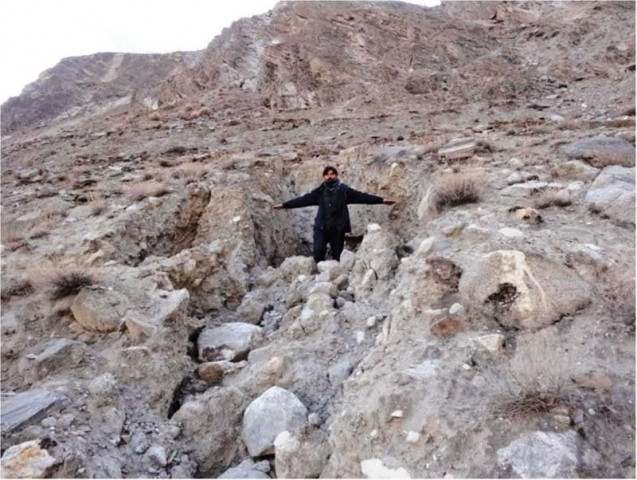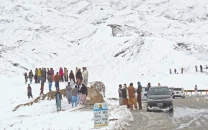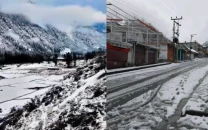Precautionary measures: Miacher Valley residents relocated to safer places
Downpours, excessive agricultural activity have widened fissures in landscape

At least 54 people have been shifted to safer places. PHOTO: EXPRESS
About 70 kilometres from Gilgit, the valley is located on slopes which have developed cracks. The monsoon rains coupled with agricultural activity over the years have caused fissures in the landscape to widen.
“There are wide cracks in the valley and the government has asked us to shift to safer places as a precautionary measure,” Abbas Ali, a resident, told The Express Tribune on Thursday.
He added, “Food items have also been provided to us by G-B Disaster management Authority.”
“This is a precautionary measure, ahead of rains, and so far 54 people have been shifted to safer places,” DMA DG Waheed Shah told The Express Tribune.
It is believed that if the slopes fall, the magnitude of the catastrophe will be 10 times more intense than the calamity that struck G-B in the form of Attabad Lake disaster in January 2011.
Landslide: Another disaster awaits G-B as cracks in Miacher slopes widen
Warned against imminent disaster
According to sources privy to the development, Geological Survey of Pakistan (GSP) recently conducted surveys and published reports exposing new hazards lying above the Karakoram Highway in Nagar.
“A massive landslide at Miacher might soon block Hunza River again, damaging the newly-constructed corridor besides ruining the source of livelihood of 400 families,” one of the reports read.
A local landscape ecologist Mujahid Ali Shah had warned about the dangers three years ago, prompting National Disaster management Authority (NDMA) to visit and conduct surveys.
“In case slopes fall, the resulting landslide will create a damming wall 400 to 500 metres high and 200 metres wide out of a total of 1,000 to 2,000 million cubic metres of rock debris,”
Shah had warned.
Towards accountability, solution
Helga Ahmad, a social worker who settled in Pakistan decades ago after migrating from Germany, launched a campaign for the safety of the people in Nagar Valley.
In her personal capacity, she wrote to G-B Chief Minister Hafeezur Rahman and ministry of climate change, amongst many others, about the massive disaster looming ahead but to no avail. “There are cracks in slopes all over the valley,” Ahmad said.
In one of her letters to the CM, she wrote, “After GSP reports have been revealed, extensive research should have been conducted to avoid another Attabad disaster.” She said the plateau was stripped bare of an extensive Sea buckthorn forest to make way for potato plantation that led to the collapse of the root system that usually holds slopes in place.
She said the population should be relocated to another area and at the same time, irrigation in the valley should be banned. “Replanting of Sea buckthorn appears to be the most viable solution.”
Published in The Express Tribune, July 1st, 2016.


















COMMENTS
Comments are moderated and generally will be posted if they are on-topic and not abusive.
For more information, please see our Comments FAQ